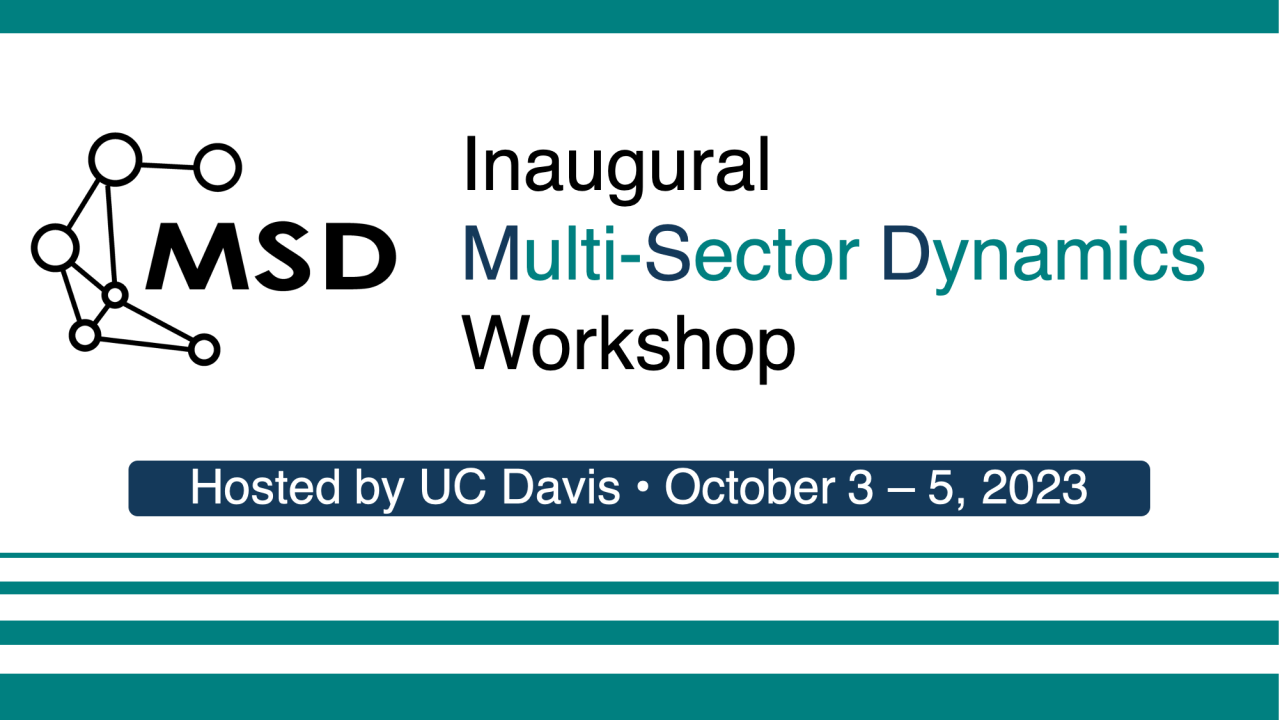
Event Date
The MultiSector Dynamics (MSD) Community of Practice is excited to announce that the Inaugural MSD Workshop will take place on October 3-5 2023 at UC Davis. The workshop aims to bring together members of the MSD community of practice to advance understanding of the co-evolution of human and natural systems, and build the next generation of tools that bridge sectors, scales, and systems to realize a more resilient and equitable future. The theme of the workshop is "Advancing Complex Adaptive Human-Earth Systems Science in a World of Interconnected Risks".
The workshop will host approximately 100 attendees, with a large focus on students and early career scientists (Ph.D. received within the past 10 years). Workshop goals, along with a preliminary agenda and a list of preliminary thematic breakout sessions are provided below.
Workshop attendees will be selected based on the submission of an abstract, a biosketch and a workshop leveraging plan that demonstrate novel research relevant to the MSD workshop cross-cutting themes and the capacity to advance the workshop objectives. The application deadline to attend the MSD Workshop is June 2, 11:59pm (Pacific Time).
Limited funds are available to waive registration fees and for travel awards. These funds will be distributed based on the evaluation of the abstract, biosketch and workshop leveraging plan.
Motivation
The next decade represents a tremendous opportunity for the United States to address the many societal and environmental challenges we face, such as climate change and energy security. The impacts of a wide range of stressors (e.g., wildfires, floods, droughts, sea-level rise) and influences (e.g., advances in education, economic development, and technology transitions) highlight the importance of understanding how critical societal systems (i.e., infrastructure, governance, and socioeconomic systems) are shaped by and also shape Earth and environmental systems. These systems are interdependent through flows of materials, energy, water, land, human capital, and other resources, as well as through networks of markets, formal governance structures, and other socioeconomic institutions and processes. The field of MSD explores the dynamics and coevolutionary pathways of human-Earth systems with a focus on critical goods, services, and amenities delivered to people through interdependent sectors such as energy, food, transportation, health, housing, and recreation. The emergent complexity of the processes and outcomes that MSD addresses, varying from planned societal transitions (e.g., deep decarbonization) to coping with shocks (e.g., economic, climate, and/or social), creates a tremendous need for accelerating the scope and depth of knowledge required to advance scientific understanding.
Workshop Goals
- Integrating students and early career scientists to high-level MSD research
- Fostering collaborations opportunities across the MSD Community of Practice
- Integrating the different MSD Working Groups
- Disseminating existing MSD models, data, and methods
- Networking and interdisciplinary collaboration opportunities
- Developing manuscripts for the Earth's Future special issue 'Multi-Sector Dynamics: Advancing Complex Adaptive Human-Earth Systems Science in a World of Interconnected Risks'
Preliminary Agenda
- Day 1:
- Morning: plenary presentations identifying the workshop goals and the cross-cutting challenges and themes to be discussed in the breakout/planning sessions
- Afternoon: poster session and networking activities
- Day 2:
- Morning: thematic breakout sessions
- Afternoon: thematic breakout sessions and plenary breakout sessions reporting
- Day 3:
- Morning: thematic planning sessions
- Afternoon: thematic planning sessions and planning breakout sessions reporting
Thematic Breakout/Planning Sessions
We anticipate the following breakout/planning sessions to address the following cross-cutting challenges and themes with MSD research:
- Inspiring operational relevance in MSD research related to climate change and energy transition
- Better capturing human actors and their responses to emergent risks in MSD systems
- Understanding how human and natural system drivers and uncertainties at different scales combine to shape global-to-local dynamics
- Challenges and approaches to represent and analyze equity in MSD research
- Using AI to advance the modeling of complex adaptive Human-Earth systems
The structure and format of the workshop, as well as the thematic breakout/planning sessions listed above, may evolve in the coming months as the Technical Program Committee further develops the workshop agenda.